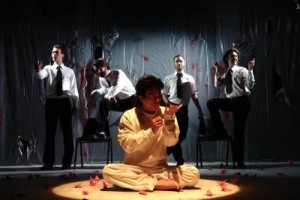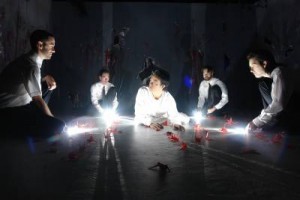
BRUTAL TOILET-SEX MURDER IN BETHNAL GREEN!
British tabloids trumpet the news of a vicious murder in a public lavatory in East London. John Lee, a nineteen-year-old Londoner of Asian descent, is accused of cold-bloodedly shooting William Hope, his twenty-six-year old Caucasian lover, six times at close range. Bang! Bang! Bang! Bang! Bang! Bang!
Thus begins Singapore-born playwright Chay Yew’s Porcelain, opening Celebration Theatre’s 2008-2009 season with quite literally a bang.
Yew is a playwright with a lot to say, much of it angry, and Porcelain is an angry play. Yew (and John Lee by extension) is angry at a society which views him as “Oriental,” and uses ugly words to make him feel less of a man. He is angry at a gay community that sees Asian men as asexual, or simply undesirable. He is angry at self-described “straight” men who seek sex with other men and then declare themselves heterosexual, men who run (or rape) when they find themselves threatened by feelings of love for precisely the people they disparage.
As a freshman play, 1992’s Porcelain proved a triumph for a young fledgling playwright, and if ever a production can be called a directorial triumph, the Celebration’s Michael Matthews’ brilliant envisioning of Porcelain is just such a triumph.
The script of Porcelain is virtually free of stage directions of any kind. The following is all that Yew tells the director: The stage must be bare, except for five chairs facing the audience, the floor littered with red origami cranes. Dressed in white, the actor playing John relentlessly folds new cranes as the audience enters. The four actors known only as Voice One, Voice Two, Voice Three, and Voice Four are Caucasian and do not look at each other unless otherwise instructed.
And that’s all.
Everything that “happens” on stage over the course of the play’s 80 minutes and 29 scenes depends on the imagination of the director.
Matthew’s superb direction of Beautiful Thing, The Bacchae, Stupid Kids, and Sissystrata led to his being named a StageSceneLA Director Of The Year two years running. His work here is quite possibly his best yet, and the same can be said for the extraordinary Tim Swiss’s breathtaking lighting design. So perfectly intertwined is their work on Porcelain, which the audience feels from the moment of entering the theater, that it is impossible to discuss the work of one without the other.
The clear bulbs in the Celebration’s houselights have all been replaced with red ones, which shine down on West Liang’s white-clad figure and the dozens of red origami cranes strewn about the floor. Kurt Boetcher’s set design (another sensational one from the man who scenic designed of all of Matthews’ StageSceneLA-honored work) covers the upstage walls with ripped, bloody plastic sheeting, as if torn by the murder victim in an attempt to escape. Bloody handprints cover the Celebration’s roof-support pillar.
There is no sound design per Yew’s instructions that “no music or sound effects should be employed during the play.” The four Voices set the East London scene by imitating Big Ben striking four o’clock, sounds of cars honking, and an underground train screeching to a halt. Their words overlapping, the Voices inform us of the killing, then become Haiku-like as they give details: “Warm blood. Red patterns. Flower-like. Patterns. Slow-moving. Patterns,” and “Fluorescent lights above. And a boy standing. Breathing hard. Weeping.”
For a Channel Four “chat show,” Matthews has its four talking heads simultaneously crossing and uncrossing their legs, to the left, to the right, to the left again. Funny, and spot-on. As the Voices describe a public lavatory sexual encounter (“John’s eyes make a quick study. Of the man’s body. His eyes. Transfixed. Touching his body. His trembling hands. run down the stranger’s body. Unevenly. Nervously.”), Matthews stages a simulated oral sex scene with the actors playing John and his anonymous sex partner seated in separate chairs, several feet apart from each other, both facing the audience. At times, Matthews has the Voices as transfixed observers; at other times, they are like feral beasts, crouching towards John Lee as if about to attack. In a love scene between John and William, they are poised caressingly on either side of the lovers, as if physical manifestations of their love.
Midway through the play, Swiss’s until then stark lighting turns suddenly warm and embracing as John describes falling in love with William and his feelings of being “high like a kite. Like the whole world was under my feet. Like nothing could go wrong.” Hand held flashlights are used by the actors in several instances to spooky effect. Hidden fluorescent lights suddenly illuminate the stage from behind when we finally witness the unfolding of the murder scene until, with the first shots, the stage goes red, blood red until the final shot has been fired.
In the play’s most chilling scene, John’s brutal rape at the hands of the man he loves with a passion bordering on obsession, the stage goes completely black, surrounding the audience in darkness as we hear the sound of a slap, whimpering, a struggle, gagging, hard breathing, another vicious slap, and another, then John’s agonized screams, and finally his forced confession that “I want it,” a confession which becomes an impassioned “I want you!” and a near-whispered “I love you.” As we cannot see what is “happening” onstage and can only imagine it in our mind’s eye, the effect is one of profound discomfort, and truly devastating.
Matthew’s cast is a stellar one indeed, beginning with the gifted Liang as John Lee. Having seen Liang twice previously (in Tape and Metamorphoses), I knew I would be seeing fine work, but his macho turns in both those plays did not prepare me for the gentleness and sweetness of his performance here. Liang makes us feel all of John’s longing and love and desire to be accepted, and the scene in which a weeping John cradles the body of his dead lover is an exquisite feat of multi-layered acting.
Though the actors playing the four Voices have multiple roles, Yew allots them each one major one in which to strut their thespian stuff.
Bob Simpson (Voice One) does his accustomed excellent work as the stuffy Dr. Jack Worthing, John’s court-appointed psychologist, whose initial homophobia slowly turns to understanding and even affection for his patient.
Michael Mullen (Voice Two) does the evening’s most varied work, from his fabulously queeny commentator on gay life in London to Voice Two’s biggest role, that of John Lee’s Chinese father, and it is here that Mullen astounds, digging deep into the wounded soul of a man who’s only son has committed the ultimate betrayal.
Thomas La Barbera Christensen (Voice Three) has perhaps less to do than the other three voices, but he acquits himself admirably, especially as the slick Channel Four news commentator.
Finally, there is the powerhouse performance of Christopher Young (Voice Four) in the role of William Hope, John’s rough, tattooed lover. Young reveals every facet of a young man unable to accept his same-sex desires as being more than simply carnal. We see the tenderness that William is capable of and the brutality which is always near the surface. It is Young’s effectiveness in this role which makes the murder understandable, and all the more devastating.
Porcelain’s cast perform in a variety of accents, most of them spot-on, with credit due to dialect coach Coco Kleppinger.
Despite moments of unexpected humor, Porcelain is (as might be expected) not a “fun” 80-minutes of theater. It’s not supposed to be. There are times when being a theatergoer means walking on the wild side, taking risks, and being upset and uncomfortable, because the rewards are so great. Porcelain offers those rewards in abundance.
Celebration Theatre, 7051B Santa Monica Blvd.,Hollywood.
www.celebrationtheatre.com
–Steven Stanley
October 10, 2008




 Since 2007, Steven Stanley's StageSceneLA.com has spotlighted the best in Southern California theater via reviews, interviews, and its annual StageSceneLA Scenies.
Since 2007, Steven Stanley's StageSceneLA.com has spotlighted the best in Southern California theater via reviews, interviews, and its annual StageSceneLA Scenies.







 COPYRIGHT 2024 STEVEN STANLEY :: DESIGN BY
COPYRIGHT 2024 STEVEN STANLEY :: DESIGN BY